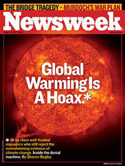 Newsweek ran a cover story on global warming or, more exactly, a cover story hypothesizing some vast denial machine that was covering up the truth.
Newsweek ran a cover story on global warming or, more exactly, a cover story hypothesizing some vast denial machine that was covering up the truth.
It was one of the most irresponsible pieces of journalism we’ve read in awhile on the cover of a major magazine. And they were called to task on it by one of Newsweek’s own columnists, Robert J. Samuelson:
If you missed NEWSWEEK’s story, here’s the gist: A “well-coordinated, well-funded campaign by contrarian scientists, free-market think tanks and industry has created a paralyzing fog of doubt around climate change.” This “denial machine” has obstructed action against global warming and is still “running at full throttle.” The story’s thrust: discredit the “denial machine,” and the country can start the serious business of fighting global warming. The story was a wonderful read, marred only by its being fundamentally misleading.
The global-warming debate’s great un-mentionable is this: we lack the technology to get from here to there. Just because Arnold Schwarzenegger wants to cut emissions 80 percent below 1990 levels by 2050 doesn’t mean it can happen. At best, we might curb emissions growth.
Consider a 2006 study from the International Energy Agency. With present policies, it projected that carbon-dioxide emissions (a main greenhouse gas) would more than double by 2050; developing countries would account for almost 70 percent of the increase. The IEA then simulated an aggressive, global program to cut emissions based on the best available technologies: more solar, wind and biomass; more-efficient cars, appliances and buildings; more nuclear. Under this admitted fantasy, global emissions in 2050 would still slightly exceed 2003 levels.
Even the fantasy would be a stretch. In the United States, it would take massive regulations, higher energy taxes or both. Democracies don’t easily adopt painful measures in the present to avert possible future problems. Examples abound. Since the 1973 Arab oil embargo, we’ve been on notice to limit dependence on insecure foreign oil. We’ve done little. In 1973, imports were 35 percent of U.S. oil use; in 2006, they were 60 percent. For decades, we’ve known of the huge retirement costs of baby boomers. Little has been done.
One way or another, our assaults against global warming are likely to be symbolic, ineffective or both. But if we succeed in cutting emissions substantially, savings would probably be offset by gains in China and elsewhere. The McKinsey Global Institute projects that from 2003 to 2020, the number of China’s vehicles will rise from 26 million to 120 million, average residential floor space will increase 50 percent and energy demand will grow 4.4 percent annually. Even with “best practices” energy efficiency, demand would still grow 2.8 percent a year, McKinsey estimates.
Against these real-world pressures, NEWSWEEK’s “denial machine” is a peripheral and highly contrived story. NEWSWEEK implied, for example, that ExxonMobil used a think tank to pay academics to criticize global-warming science. Actually, this accusation was long ago discredited, and NEWSWEEK shouldn’t have lent it respectability. (The company says it knew nothing of the global-warming grant, which involved issues of climate modeling. And its 2006 contribution to the think tank, the American Enterprise Institute, was small: $240,000 out of a $28 million budget.)
This is where the sudden focus of supermarket chains, particularly in the U.K., on the carbon footprint of cucumbers, becomes positively wacky. Where is the evidence that fresh produce production for human consumption is a significant contributor to this problem? Where is the evidence that even dramatic changes in produce production and distribution will make any significant contribution to solving this problem?
On what basis do we suddenly tell consumers this is an important issue when buying fresh produce, but it’s not an important issue when buying curtains or clothing or tables or almost anything else?
Samuelson had another point to make:
We in the news business often enlist in moral crusades. Global warming is among the latest. Unfortunately, self-righteous indignation can undermine good journalism. Last week’s NEWSWEEK cover story on global warming is a sobering reminder. It’s an object lesson of how viewing the world as “good guys vs. bad guys” can lead to a vast oversimplification of a messy story.
Unfortunately, the same applies to retailers looking to differentiate themselves. It is something to be ashamed of… and something to avoid.






